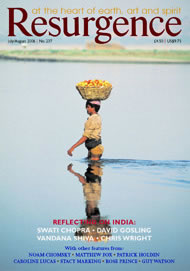IN THE HEELS of terrifying reports about climate change, we now have new warnings of a related set of catastrophic scenarios, rooted in the ‘peak oil’ crisis. In these two books, Richard Heinberg, a professor at New College of California, Sonoma, describes the present historical moment as one that deeply threatens the continued viability of industrial society, the global economic system, the mega-nation-state, and the ways we live in the modern world, though he also offers some long-term alternative pathways – he calls them “lifeboats” – to the future.
Peak oil is that moment when global oil reserves pass their ‘peak’ availability, and begin to decline; many say the moment has already passed. Heinberg explains that the hunt for remaining supplies will now be in ever more distant, difficult and unstable contexts. Even in relatively nearby places where oil is still abundant, as in the ‘tar sands’ of Alberta, Canada, the oil is very difficult and costly to retrieve, while causing devastating environmental damage, including depletion of topsoil, scarce freshwater and natural gas. Heinberg adds that future oil recovery in most places will produce a net energy loss: more energy will be used to retrieve supplies than is gained.
Combine this crisis with the grave upheavals from climate change, and from a third, little-noticed condition, ‘peak minerals’ – depletion of the planet’s industrial minerals from over-consumption, overpopulation and the ideology of exponential growth – and we come to understand something ghastly: the ultimate limits of the natural world are directly in sight. Most importantly, the modern era of abundant cheap energy may be over. With it would go the modern technological base, most long-distance transport and trade, and most modern manufacture, as well as urbanism and suburbanism. All are utterly dependent on ever-growing supplies of cheap energy and minerals. The same circumstances foretell an end to the ability of large nation-states to maintain far-flung economic empires, militaries, and global supply lines. Heinberg pulls no punches: all large-scale systems that sustain the modern world are undergoing slow collapse, he says, as they defy the limits of nature.
Some will ask whether we should be crying about this, or cheering. For those who are battling rampant industrialism and globalisation such outcomes might sound good. Won’t they provide new opportunities to build alternative systems? Maybe, and Heinberg delves deeply into those. But there is the prior daunting problem of how we get from here to there, alive.
It is entirely possible that the initial outcomes from such breakdowns of global operating systems will be a general state of chaos, widespread hunger, and violent scrambles for what remain of resources, globally and locally. The Iraq war is certainly one early example: a mad grab by elites for remnant oil supplies. Wars over minerals, water and other key resources will also expand, not to mention struggles for diminishing arable lands in a world riven by floods and droughts.
Heinberg labels this chaotic condition “Last Man Standing”, and says we are already well into it. Rather than address alternative modes of economic organising, the most aggressive nations compete to grab what they can by any means necessary. Heinberg raises another negative scenario, “Waiting for the Magic Elixir”, the common expectation that new technologies will save us. He splashes cold water on that idea, via detailed analyses of proposed alternatives including hydrogen, biofuels, methane, even thermal depolymerisation, and “free energy” machines. As with the tar sands, he concludes that most such systems would cost more in energy and resources than they produced, and with potentially horrific environmental consequences (especially from methane and possibly hydrogen). Even large-scale solar and wind are problematic, if deployed to sustain today’s industrial growth system. To operate on that scale, they would require an advanced high-tech production base for their own manufacture, itself demanding volumes of cheap energy that soon will not exist. Heinberg does advocate for small-scale, local solar, wind, hydro and other renewables as part of transitioning to local systems; but they could never sustain the large-scale growth-oriented industrial systems of today.
Heinberg strongly believes we can no longer prevent systemic collapse. But he argues that a conscious transition could be achieved through alternative approaches. Much of Power Down is devoted to those. In this short review, I cannot begin to cover those ideas, but some key ingredients include an immediate global rationing of remaining energy and resource supplies. (Heinberg is already circulating detailed plans among Scandinavian governments.) This goes with a sharp reversal of economic paradigms, away from economic growth toward deep conservation; dramatically reduced per capita consumption; re-allocation of resources among wealthy and poor within countries and among them; programmes to co-operatively phase down population; and radical localisation and regionalisation, with an emphasis on self-reliant local systems: all of this within a new ethic of community sufficiency, given priority over wealth creation. For today’s localisation movements, the motto could become “Less and Local”.
Heinberg hopes that, ideally, in the early stages national governments would appreciate the emergency and help facilitate change, beginning with rapid disconnection from carbon-based energy systems, while phasing in smaller-scale renewables. But if, as is likely, elite classes won’t go along, preferring “Last Man Standing” options, then it’s the job of our Movements to find ways and places to begin the process anyway. These are the author’s “lifeboats”: essentially democratically managed self-standing units of community-based food-growing and resource-sharing systems that have a chance of keeping humans afloat while superstructures of material waste crumble.
All in all, it’s not a lovely picture. Yet from it, a better future has a chance to emerge. Heinberg must be commended for these works. He has shown impressive discipline and courage to present such stark realities in such an honest, humane, uncompromised and actually, in the end, optimistic manner.
Richard Heinberg will be teaching at Schumacher College, November 2006.
For further information visit
Jerry Mander is founder of the International Forum on Globalization.







